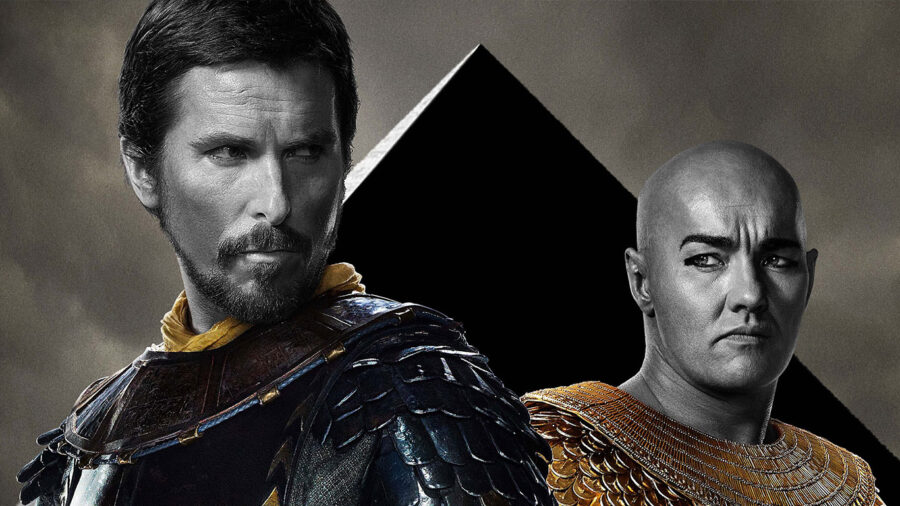Warning: This post contains spoilers. If you want to see Exodus: Gods and Kings (E:GK) for its surprises and twists, best to go see and read this later.
Ridley Scott’s latest epic is definitely that. There are plenty of scenes filled with stunning special effects, powerful storm clouds, and confrontations involving characters with wild eyes and wilder hair. The stuntmen get plenty of work: hardly 10 minutes go by without someone being set on fire or getting thrown from a horse. The camera is always panning back to show impressive vistas of ancient settings. For all that, it was easy to see why it was so poorly reviewed (28% positive on Rotten Tomatoes). Despite the grandeur the plot slowed to a crawl at times. The love story between Moses and Zipphorah could be painfully awkward. It seemed that the actors couldn’t decide what accent was best suited for ancient Egypt. There are plenty of reviews, however, that critique the movie on that level.
I am more concerned with the question most readers of the Bible will come with: How is the biblical material handled and interpreted. I, for one, found myself drawn along not so much by the plot and pacing but by my interest in how the next point in the narrative would be visualized. How will Moses be driven from Egypt? What will they do with the Burning Bush? What will the plagues look like? And of course, how does the episode at the Red Sea play out? The decisions made on this level were quite interesting. I will focus on a few of the major themes that popped out to me.
First of all is Moses. In E:GK Moses is first and foremost a general. He is a leader of men and a leader of conflict. Throughout the movie he wields a sword, a symbol of both his power and his connection to Ramses, rather than a staff. When he first returns to Egypt it is as a general that he threatens Pharaoh, and when that does not work it is with the sword that he intends to free the Hebrews. Rather than the usual narrative of a series of direct confrontations followed by signs, wonders, and eventually plagues, Moses and his band of loyal insurgents take to the hills and begin a guerrilla war of terrorism against the inhabitants of Egypt. When this proves to slow for God’s tastes God takes the reigns and the plagues begin. There is never a point when this portrait of Moses shifts. He is a general until the end when he confronts Ramses in the middle of the Red Sea, swords in hand, and both are swept away by the returning (100 foot tall) tidal wave. Don’t worry, he somehow survives to go on to be not a prophet but a nation-builder.
Second, God is portrayed throughout the film as an impatient and headstrong child. Actually that is too kind by half: God is a brat. Moses’ first meeting with him is the result of a bad blow to the head during a rock slide, and throughout the movie God appears whenever he wants and when Moses seems to want to speak to him least. Moses’ primary failure is that his methods are too slow for God. The plagues result after a particularly snotty interaction. When God initially appeared as a young boy my first thought after surprise was that this portrayal may open an intriguing exploration. It didn’t. God appears as a child because he is a child, complete with all the shortcomings common to an 8 year old boy.
Third, it seemed that wherever possible the filmmakers sought to explain the miraculous in terms of the natural. Remember Moses’ tumble? That was the beginning. The plagues are set off by a massive, bloody crocodile frenzy (yes, actually) so that the Nile is not turned to blood but is rather filled with it. This creates a chain reaction: the frogs leave the Nile because of the blood, the flies breed in the bodies of the dead frogs, the flies spread the plague of boils to the people. After this, the explanations drop out and the rest of the plagues happen more or less miraculously. What is interesting is that Moses is reduced to a spectator at this point. No staff and with deep misgivings about God’s methods he must stand back and watch. The Red Sea is parted by a meteor strike, which Moses clearly has nothing to do with. He is laying on a beach, asleep and in despair. And the waves get him too, eventually.
I find this mash-up of naturalistic explanations and theistic acts very, very intriguing. It is a beautiful snapshot of the post-Enlightenment mentality in which natural science is still king and priest, and yet cannot account of everything just yet. The portrayal of Moses fits the same mould. The concept that Moses is a prophet seemed to play little or no role in the formation of the character in the movie. He talks with God, sure, but it is all a very private personal matter. We get scene after scene of Moses yelling at baby-God, and every once in a while someone catches him at it. He is then shown as arguing with empty space. Is this 21st century religion in a nut-shell? Maybe so.





Leave a Reply
Your email is safe with us.